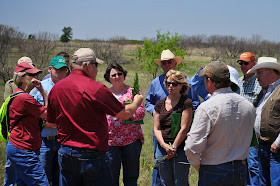AgriLife Extension sets five Quail Appreciation Day programs in May
Writer: Steve Byrns, 325-653-4576, s-byrns@tamu.edu
Contact: Dr. Dale Rollins, 653-4576, d-rollins@tamu.edu
SAN ANGELO – The Texas A&M AgriLife Extension Service will conduct five Quail Appreciation Day programs across the state in May to bring landowners, naturalists and other enthusiasts abreast of the current quail population decline and present some possible remedies, the programs’ coordinator said.
“Bobwhite quail are on the ropes in most areas of their range, including most of Texas,” said Dr. Dale Rollins. Rollins serves as the state coordinator for the Reversing the Decline of Quail in Texas initiative. He’s also director of the Rolling Plains Quail Research Ranch at Roby and a retired AgriLife Extension wildlife specialist at San Angelo.
“These Quail Appreciation Day programs offer land managers an opportunity to learn up close and personal how management impacts quail abundance,” he said.
All the programs share a similar agenda, starting at 8:30 a.m. with registration and ending by 4:30 p.m., but the curriculum of each will be tailored to fit the part of the state where a particular appreciation day is set.
Dates, counties and AgriLife Extension agents handling the details are as follows:
-May 7, Clay County, Missy Hodgin, 940-538-5042.
-May 13, San Saba County, Neal Alexander, 325-372-5416.
-May 14, Shackelford/Stephens counties, Rocky Vinson, 325-762-2233, and Leslie Neve, 254-559-2313, respectively.
-May 20,Victoria County, Peter McGuill, 361-575-4581.
-May 23, Wheeler County, Dale Dunlap, 806-826-5243.
All the programs will consist of a six-hour quail management workshop that will include quail physiology, management topics and an afternoon tour featuring regional management and habitat assessment techniques.
“The theme ‘appreciation’ has various contexts, all of which are important here,” Rollins said. “First, we ‘value and highly admire quail,’ and second, ‘we judge with heightened awareness’ the various factors and practices that impact quail abundance and how a landowner’s management practices affect quail habitat for better or worse.”
Individual preregistration is $10 due one week prior to each field day; $20 thereafter and at the door.
Three Texas Department of Agriculture continuing education units for private applicator license holders will be available, two general and one integrated pest management.
“Essentially, we ask attendees to ‘think like a quail’ for the entire workshop,” Rollins said. “When they begin to see the world as a quail sees it, they have a better appreciation as to how their land management decisions, such as grazing and brush management for example, can have positive or negative impacts on quail, usually depending on how they’re implemented. Our ultimate goal is to promote more lifelong students of quail.”
The Quail Appreciation Day series is one component of AgriLife’s Reversing the Decline of Quail Initiative.
Other components include a series of research projects and “QuailMasters,” a series of continuing education workshops for serious “students of quail.”
